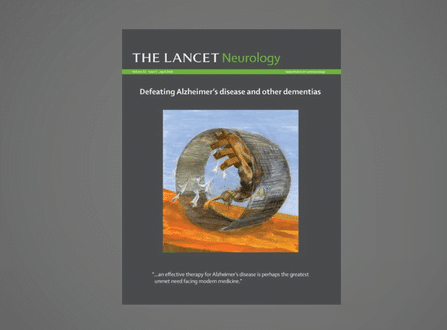Today the Lancet Neurology Commission released a major report detailing the state of research and patient care for Alzheimer´s disease and other dementias and providing recommendations for the future. The conclusion: A concerted effort and long-term economic commitment are critical to meeting the global challenge of Alzheimer’s disease and other dementias.
The comprehensive report, which was the result of a collaborative effort between more than 30 leading researchers from around the world, will also be presented to the European Parliament Commissioners today in Brussels.
The Lancet Neurology Commission, initiated by Lancet editors, is led by Professor Bengt Winblad of the Center for Alzheimer Research at the Karolinska Institutet in Sweden. Winblad is also a member of the JPND Scientific Advisory Board and was the coordinator of BIOMARKAPD, a JPND project on Biomarkers for Alzheimer’s disease and Parkinson’s disease. Three other members of the JPND Scientific Advisory Board, Prof. Martin Knapp (United Kingdom), Prof. Bruno Dubois (France), and Prof. Philip Scheltens (Netherlands), as well as the Chair of the JPND Management Board, Prof. Philippe Amouyel, participated as experts in this report. The commission was formed with the aim of providing expert recommendations and information to politicians and policymakers about Alzheimer´s disease and related dementias.
The report encompasses the fields of health economics, epidemiology, prevention, genetics, biology, diagnosis, treatment, care and ethics. To reduce the burden of dementia, the commission advocates that public governmental agencies form large multinational partnerships with academic centres and pharmaceutical companies to deploy capital resources and share risk.
“To defeat Alzheimer’s disease and other dementias, united actions are needed, not only within research, but also within the political arena on all levels,” said Winblad. “My hope is that our work will stimulate increased national and international collaboration.”
Alzheimer’s, the most common form of dementia, accounts for approximately 60 percent of cases. The most important risk factor is age, and as life expectancy increases, the number of people with dementia is also expected to rise. In 2015, almost 47 million individuals around the world were estimated to be affected. By 2030, the number is expected to reach 75 million. By 2050, up to 131 million people are expected to be burdened by the disease. So far, no treatment is available to effectively halt or reverse the disease.
Alzheimer’s disease and related disorders are one of the major targets of JPND, which as the largest global research initiative aimed at tackling the challenge of neurodegenerative diseases is cited in the report as an example of the sort of action needed to make meaningful progress. “To speed up progress even more, ” the report asserts, “this global collaboration must be extended to even more countries.”
For Winblad, the onus is now on governments to take action — and quickly: “What we need now is for the politicians to realise that this is a growing problem that already costs society tremendous amounts of money,” he said. “We need investments of resources in research in all areas involved in this disease, to find better drugs, but also to improve compassionate care and prevention.”

